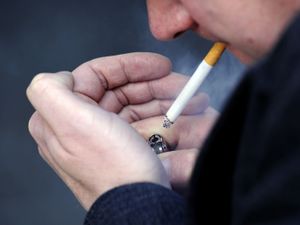Health
Study Links Early Smoking in Fathers to Faster Aging in Children

Research presented at the European Respiratory Society Congress in Amsterdam indicates that children may experience accelerated biological aging if their fathers smoked during puberty. This finding highlights the potential long-term effects of parental smoking on future generations, particularly when fathers begin smoking at the age of 15 or younger.
The study examined the DNA of 892 participants from various European countries and Australia, ranging in age from seven to 50. Researchers analyzed epigenetic markers, commonly referred to as an epigenetic clock, to assess biological aging. Participants were asked detailed questions about their smoking habits and those of their parents, allowing researchers to establish a correlation between early paternal smoking and increased biological age.
Individuals whose fathers began smoking during their teenage years were found to be approximately nine months to a year older, biologically, than their chronological age. The study revealed that this effect was more pronounced in participants who had smoked themselves. In contrast, those whose fathers started smoking later in life showed only a minimal increase in biological age. No significant correlation was found in children whose mothers smoked prior to pregnancy.
Dr. Juan Pablo Lopez-Cervantes from the University of Bergen led the research and emphasized the implications of their findings. “Our previous work has demonstrated that smoking during puberty can harm not only the smoker but also their future children,” he stated. He further explained that while the study does not fully elucidate the mechanisms behind the accelerated aging, it suggests that smoking during puberty may alter the epigenetic material in sperm cells, thereby affecting offspring.
The implications of accelerated biological aging are significant, as previous studies have linked it to a higher risk of diseases such as cancer, arthritis, and dementia. Dr. Lopez-Cervantes urged for increased awareness among young individuals who smoke or use nicotine products, underscoring the importance of preventative measures. “Stronger efforts to prevent tobacco use in adolescence should be a priority for policymakers,” he said. “Such initiatives could benefit both current and future generations.”
Sarah Sleet, chief executive of Asthma and Lung UK, reinforced the necessity of keeping children away from smoking. “This research highlights why we must do everything we can to keep children away from smoking and help them stop if they have started,” she noted. Sleet emphasized the importance of public health education aimed at boys approaching puberty, stressing the potential long-term consequences of smoking on their future children.
She also pointed out that adequate funding for smoking cessation services is essential. “You are three times more likely to quit smoking successfully if you have a combination of counselling support and treatment to help relieve cravings and tackle tobacco dependence,” Sleet explained. She advocates for a ‘polluter pays’ levy on the tobacco industry to fund these initiatives, noting that smoking cessation services can ultimately save healthcare costs.
Dr. Stamatoula Tsikrika, chairwoman of the European Respiratory Society’s expert group on tobacco, smoking control, and health education, highlighted the generational impact of smoking. “We all know that smoking causes diseases such as asthma, COPD (chronic obstructive pulmonary disease), and cancer,” she stated. “What we’re starting to learn is that the damage caused by smoking can persist across generations.”
While the rates of smoking among teenagers appear to be declining, there is a worrying trend of increasing vaping. Dr. Tsikrika emphasized the need for further research into the long-term effects of vaping on young people. “This research serves as an important reminder that we must protect children and teenagers from nicotine addiction, smoking, and vaping,” she concluded.
The findings of this study underscore the complex interplay between parental behaviors and the health of future generations, stressing the urgent need for effective interventions to combat smoking among adolescents.
-

 Health3 months ago
Health3 months agoNeurologist Warns Excessive Use of Supplements Can Harm Brain
-

 Health3 months ago
Health3 months agoFiona Phillips’ Husband Shares Heartfelt Update on Her Alzheimer’s Journey
-

 Science1 month ago
Science1 month agoBrian Cox Addresses Claims of Alien Probe in 3I/ATLAS Discovery
-

 Science1 month ago
Science1 month agoNASA Investigates Unusual Comet 3I/ATLAS; New Findings Emerge
-

 Science4 weeks ago
Science4 weeks agoScientists Examine 3I/ATLAS: Alien Artifact or Cosmic Oddity?
-

 Entertainment4 months ago
Entertainment4 months agoKerry Katona Discusses Future Baby Plans and Brian McFadden’s Wedding
-

 Science4 weeks ago
Science4 weeks agoNASA Investigates Speedy Object 3I/ATLAS, Sparking Speculation
-

 Entertainment4 months ago
Entertainment4 months agoEmmerdale Faces Tension as Dylan and April’s Lives Hang in the Balance
-

 World3 months ago
World3 months agoCole Palmer’s Cryptic Message to Kobbie Mainoo Following Loan Talks
-

 Science4 weeks ago
Science4 weeks agoNASA Scientists Explore Origins of 3I/ATLAS, a Fast-Moving Visitor
-

 Entertainment4 months ago
Entertainment4 months agoLove Island Star Toni Laite’s Mother Expresses Disappointment Over Coupling Decision
-

 Entertainment3 months ago
Entertainment3 months agoMajor Cast Changes at Coronation Street: Exits and Returns in 2025









